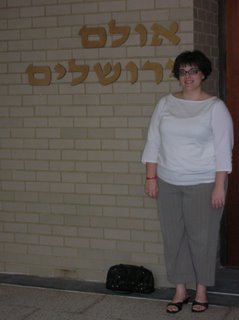Somehow, I've managed to remain sick. Summer sick is never good, winter sick seems appropriate. But despite taking all my meds and sleeping and drinking lots of fluids, I have managed to stay sick. It's quite unpleasant.
Tomorrow is the
17th of Tammuz. For many, it means little. For most, Tammuz is probably an uber foreign word. Tammuz is a month in the Hebrew calendar and the 17th marks the beginning of three weeks of mourning for the destruction of the first and second Temples in 586 BCE and 70 CE, respectively. The 17th of Tammuz is a fast day, one of four mentioned by the prophets, but it's a fast that lasts from dawn until dusk. Thus, no drinking or eating, though many of the restrictions for other fast days (like on Tisha B'av or Yom Kippur) aren't enforced on this fast day. The three weeks lead up to Tisha B'av and there are a boatload of commandments on what to do and what not to do during the three weeks and the final nine days leading up to
Tisha B'av. Most don't adhere to the restrictions, though some hold to some.
As for me, I adhere to the fast days. Thus tomorrow is a fast day for me. I could get up before dawn and eat something, but I believe that would only make me more hungry throughout the day, and I'd lose focus. Interestingly, there's a luncheon and talk with the Isreali ambassador to the U.S. tomorrow. A
LUNCHEON. Hear me? A
LUNCHEON on a fast day? Now, I'm not one to be all huffy puffy, but chances are there'll be a lot of Jews going to this, and while I'm not saying that every Jew in the D.C. metro area is fasting tomorrow, I'm sure quite a few are. In fact, I know quite a few going are. I e-mailed the office and asked about it and the director assured me that she, too, was fasting and that I may be happier to just come to the talk and not the lunch. Thus, that is what I shall do.
These words are more menat for Tisha B'av specifically, but I think they encompass the three weeks, the nine days, and both fast days.
Recognizing the empty space that can't be filled with distraction or replacement is one of life's most profound experiences. There are losses so devastating that words, no matter how carefully selected, are cheap and banal at best and patronizing at worst. When there is nothing to say, nothing is more eloquent than silence.
There are losses that not only defy any lexicon, but they are so enormous that even our minds cannot grasp them, and we find ourselves in emotional denial. When we realize that the life of any Holocaust survivor has chapters that can never be digested, let alone expressed, we can begin to understand the awesome silence of loss. (from aish dot com)
I'm sure I'll write more on the mourning days as time moves along and as Tisha B'av closens. Why fast and mourn when something like the destruction of the Temple is so far removed, you ask? Some may disagree with my feelings about the Temple, the Beit HaMikdash, but without it, the Jews are a diasporic people, wandering in the face of persecution without the comfort of a place to call our own. We have Israel, our nation for our people. Most Reform Jews don't necessarily believe in the necessity for a Temple to be built. But it's a dream that I cannot live without. The magnitude of such a place mystifies me, really, and is alluring.
And also, there are more reasons than purely the Temples falling. Modern events that shape our lives and how we look at our history and other peoples. Tisha B'Av is also the day in which the Inquisition edicts were signed over 500 years ago. The Jews were expelled from England in 1290 and the first killings at Treblinka happened in 1942. It is also the fateful day in 1914 that started the World War One, which inevitably led to the Holocaust.
Another
interesting tidbit to leave you with: Some believe the Jewish messiah of the Davidic line will be born on Tisha B'av.









